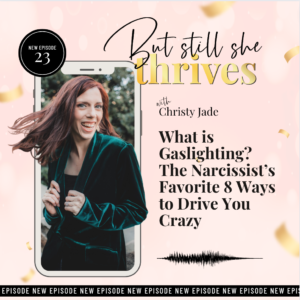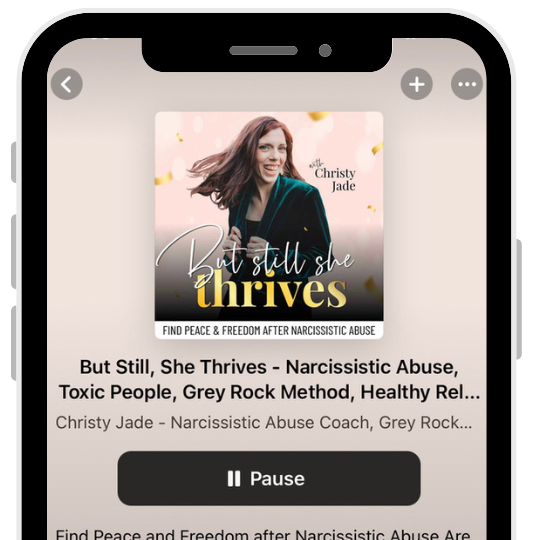What is Gaslighting? The Narcissist’s Favorite Game. A hot buzz word because narcissists are being exposed more and more, as are their tactics like gaslighting. Listen to today’s podcast to hear 8 common ways narcissists (or anyone) gaslight their victims.
My 4 MINUTE meditation:
https://christyjade.ck.page/insider
Join my free facebook group here:
https://www.facebook.com/groups/christyjade
WORK WITH ME:
https://christyjade.com/transformational-coaching
Have trouble setting boundaries in your life?
Grab my E-Course here:
https://christyjade.podia.com/boundariescourse
And if you just wanna peek around and find out more about me and my work..check out my website! It’s FUN AND SPARKLY 😉
Want to drop me a line or have a question? Email me anytime!
Let’s connect on social media!
https://www.instagram.com/fiercechristyjade/
https://www.tiktok.com/@fiercemamachristy
After abuse we need SIMPLE. I created a planner for busy women just like you to navigate your days easier: https://christyjade.podia.com/shethrivesplanner
I am Christy Jade, adoring wife, adoptive mama and narcissistic abuse survivor. I now help other women who have gone through abuse (or are going through it) find confidence, power and peace.
TRANSCRIPT:
Speaker 1: (00:00)
In today’s episode, we are going to talk about gaslighting. It is a buzzword, especially over the last few years. So we’re gonna dive into it and maybe you’re wondering, am I being gaslit? What are the signs of gaslighting? I will let you know. Stay tuned.
Speaker 1: (00:17)
Hey Queens, welcome to, but still she thrives. Do you wanna stop getting caught up in that wicked web of a creepy crawling narcissist? Do you find yourself up late at night replaying the abuse you put up with and wondering how you can heal now? Do you wake up hoping for healthy relationships and peace only to feel totally exhausted? And mind F girl, I see you. I’m Christy. I too had to disconnect from toxic people in my life and I wished I could undo the damage. I felt ashamed, lonely, and kind of lost. But I’m a stubborn Italian and I refuse to give up. I found ways to recalibrate my mind and body more quickly than I thought and can now share them with you. In this podcast, you’ll find coping tools, healing methods, and confidence boosters so you can trust yourself and find peace and freedom. So shields up ladies, let’s go protect our peace. Are you feeling lost after post narcissistic abuse? I’m your girl. I got you. This is my specialty. Go check out ways to work with me at www.Christyjade.com. Click on work with me and find all fun ways you can work with me, whether it’s one-on-one coaching or a prerecorded boundaries course.
Speaker 1: (01:38)
So there are several, several ways that you can be gaslit by a narcissist or, I mean, gaslighting can be a tactic used by people who are not narcissists, but narcissists definitely use a lot of these ways to get what they want. So number one, that is a pretty clear sign, especially if it’s a pattern, is getting super defensive when you are just having a normal conversation asking a normal question that they will then turn against you. We’ll get into that too. But watching their body language, seeing their response and their defensiveness when you are going about a normal conversation or a normal question, is definitely a sign. Number two, complete denial. They know it did happen, but they’re so convincing they can make you believe that it did not. Um, especially over time, like you can really start to feel cuckoo. Like wait, they’re so convincing.
Speaker 1: (02:40)
They look like they believe it honestly. They usually do not believe it, but they are so hellbent on being right and not being wrong that they will even try to convince themselves of another story or in the moment just defend, defend so much so that you start questioning yourself and then they take advantage of that and they can get you to agree with what they’re saying or even twisting the story, which is comes to our next. Number three is twisting the story. May like, they’re like, maybe it happened, but it’s not, it’s not what you remember, but you know the truth. Like you’re there going, wait, I was there, I remember this happen. And they have this way of twisting the stories, twisting the narrative. They may twist the blame. Well, often they do twist the blame. That’s very common, right? So a lot of twisting going on, twisting the story, twisting the blame.
Speaker 1: (03:38)
And that leads to the next one, which is the reversal. So they reverse everything. Like you come to them with, you know, maybe a request, maybe a boundary, maybe getting further information on something. It could be in conflict, it could not. But once they get that defense up, like we talk about number one, they will what I call the reversal, they will reverse it and deflect away from them having the accountability, right? So that again, it’ll make you feel crazy. And then you’re on the defense, right? So they are purposely reversing it. So then you’re on the defense, you have to defense yourself and it gets away from the original problem that you brought to their attention. And they can do this even by just saying things like, oh, you’re crazy or you’re dramatic, or Remember when you did this or I was just joking and then you came back at me in, in upset, but I was just joking, right?
Speaker 1: (04:36)
There’s so many different ways that they can do this reversal, but in general, look out for whenever you go to them to talk about something, does it get turned back on you? That is another very clear sign that you’re being gaslit. Number five, shaming you for bringing something up. They can, yes, they can make you feel bad about it, like the reversal, they can deny it, but they can also shame you and go into a victim mode and you know, start to make you feel bad. And maybe they say something like, I was just trying to help but you, you know, deep down, like it’s not helpful. But I was just trying to help and I was just, oh little, oh me little, oh in all innocent me. But they’re not innocent. They are vindictive, they’re intentional with what they’re doing. And now they’re going to shame you for bringing something up because they need the blame to get away from them.
Speaker 1: (05:31)
Similar thing with number six, dismissing your feelings. When you bring something up, it doesn’t matter. It’s almost as if their feelings are the only feelings that matter. That is how it feels to be with a narcissist. They will guilt you and do all that other stuff. But at the end of the day, if you ask yourself, does this person seem to value my feelings? Sit with that. If no, they don’t seem to ever care about your feelings and they do all these things to dismiss your feelings and to get it back to where they’re in a good light and maybe you’re in a bad light, that is not cool. That’s another sign. Number seven, in general, narcissists do not apologize. It is rare. There’s certain situations, and this is where it can get tricky and that’s why, you know, if you work with me or one of my clients, that is something that it’s much easier on a customized basis to be like, for me to be able to help with because I can hear the language and people can talk me through what they’re experiencing and I can, you know, really have an understanding of, okay, this person is, is not sincerely apologetic, right?
Speaker 1: (06:40)
There’s ways and you can learn it yourself too. But I’ve, I’ve been through years and years of this education and in my own life that I can really detect it. But just to give a general overview, they generally don’t apologize. Like I said, they’ll turn things around on you if they do apologize, it would be something, the language could be something like, well, I’m, I’m sorry you feel that way. Or I’m sorry you perceived it that way. I’m sorry you, I’m sorry you. Or if they’re really desperate, they, they can do a whole crocodile to your sincere sounding apology. So that’s where it can get tricky. But I trust my gut on this a lot too in my, in my past experiences of does this feel like they’re just trying to get what they want? Or does it feel like a bulb has gone off in their head?
Speaker 1: (07:25)
Sometimes? In the beginning of all this, the only way to know that is to see the actions that happen after. So sometimes I know a lot of us don’t wanna have regrets. We don’t wanna maybe kick people out of our lives without knowing. Well, maybe they were sorry. You don’t give a million chances though, right? It’s like if they’re sorry, they’re going to change that behavior because they want to make you happy and they don’t want to act that way. Narcissists, they won’t. So that’s, that is a sign. If after they say they’re sorry and the crocodile tears come pouring out and they’re gonna do this and they make promises or whatever, it’s lip service and the stuff keeps happening. That is your sign Honey bunny. That’s it. They, they’re not changing for me. More important than an apology though I value on it’s nice.
Speaker 1: (08:11)
But more important to me is the changed behavior after the apology. Okay? So that is a sign though. If in general they really don’t apologize, that can definitely be a sign. The number eight, playing the victim. So, well, what about me, right? Like if you’re having a conversation and you bring something up and the other person says, what about me and my feelings? That is not necessarily a bad sign. I think it’s human nature for us to also wanna feel seen and heard, right? So the difference is if this person is never taking accountability at all and then saying like, oh, what about me and my feelings and did it right? But they’re never saying sorry, they’re never taking accountability. That is also a sign in a normal relationship, you have a conversation, you share your feelings. Could there be defense or upset? Yes, we’re human.
Speaker 1: (09:03)
So you have to understand the difference of that. And not calling everyone a narcissist that gets defensive or feels like a victim. Cuz sometimes people have insecurities, but is to look for the patterns and also the shared accountability. And that doesn’t mean every situation, both people are quote at fault. But over time in your relationship, whether it’s romantic or friendship or family ship, whatever, is family ship a word? I don’t know. I like it. Whatever it is though. Does the other person ever say, yeah, I really hear you. I see how that could have been taken that way. I’m really sorry. Yeah, another time they might be like, you know, I just don’t see it that way. We’re gonna have to agree to disagree. I don’t, I don’t see it that way. Yes, but the narcissist will continually in a pattern, play the victim, not take accountability, maybe apologize, but there is no change to behavior.
Speaker 1: (09:52)
So those are eight signs. There, there are more. But these, this gives you like a really good starting point. And like I said, if you wanna work with me one-on-one, I have an opening right now. I will say coming up to the end of the school year, I will not be taking on private clients after mid-June except the ones who are grandfathered in that I’m already working with. So if you have been wanting to work with me, you might wanna get in there cuz I have a tight schedule and, uh, with my daughter being home for, for summer, I will be home with her and just working, uh, more of a part-time schedule. So look in the show notes if you’d like to see how to work with me. My website information is on there, my emails down there. You can join my free Facebook group for victims of narcissistic abuse.
Speaker 1: (10:43)
There are women in there who aren’t sure if it’s narcissistic abuse, but they’ve been mistreated and it’s, it’s just a really good place to hang out and work on thriving together. I have started putting little mini videos in there and, um, I do v i p pricing and stuff in there and on my email list, if you’re not on my email list, definitely sign up. I have a four minute meditation. When you sign up for that, you start getting like my newsletters and emails again with v i p pricing and little golden nuggets. My videos will be coming soon through email as well. So if you wanna get more Christy Jade in your life, you can do it by either joining that Facebook group or signing up for the meditation. And then you’ll be on my email list and we will end with your feelings matter. Okay? You deserve to feel valued and heard and your voice matters and you are a beauty queen. All right, we’ll see you in the next episode.

What is Gaslighting? The Narcissist’s Favorite Game What is Gaslighting? The Narcissist’s Favorite Game What is Gaslighting? The Narcissist’s Favorite Game What is Gaslighting? The Narcissist’s Favorite Game What is Gaslighting? The Narcissist’s Favorite Game What is Gaslighting? The Narcissist’s Favorite Game What is Gaslighting? The Narcissist’s Favorite Game What is Gaslighting? The Narcissist’s Favorite Game What is Gaslighting? The Narcissist’s Favorite Game What is Gaslighting? The Narcissist’s Favorite Game


